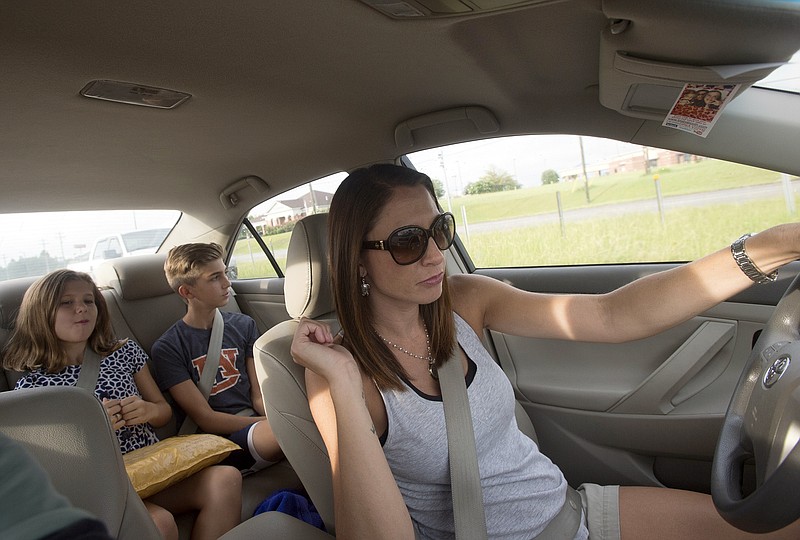MONTGOMERY, Ala. -- Carrie Richardson knows what she faces after being diagnosed with Early Onset Familial Alzheimer's.
She has seen her father die from the disease. And uncles. Her cousin.
And while she watches as her older brother exhibit the signs of the disease, the 34-year-old single mother of three children knows her time is near.
She brushes off having put liquid coffee creamer in the pantry instead of the refrigerator, and says she has been told on the phone that she has repeated questions.
"I don't make excuses for myself, because I know as well as anybody that I can't do that," said Richardson, who lives in Montgomery. "But people want to say, 'Oh, well, everybody does that.'
"It's more than just about forgetting things. It takes over your brain. You lose the ability to swallow. To talk. To clean yourself. They tell me based on all of my cognitive tests, that I'm OK. But they tell me that you can start showing signs about 10 years before you actually, really, start showing signs."
June was Alzheimer's Awareness Month. Alzheimer's is the sixth leading cause of death in the U.S., and the only cause of death among the top 10 in the United States that can't be prevented, cured or slowed down. To help bring awareness to the disease, Richardson serves as an ambassador for the Alzheimer's Association for District 2 in Alabama.
Of the 5.3 million Americans with Alzheimer's, an estimated 5.1 million people are age 65 and older, and approximately 200,000 individuals are under age 65 (younger-onset Alzheimer's). A person develops the disease every 67 seconds, according to the Alzheimer's Association.
In Alabama, there are about 86,000 people living with Alzheimer's aged 65 and older. By the year 2025, that number is expected to increase to 110,000 people aged 65 years old and older.
Nationwide, about 16 million will have the disease in 2050. It is the most expensive disease in America, costing more than heart disease and cancer.
Richardson said her father was 4 years old when his mother died from Early onset familial Alzheimer's disease in her 40s. Her father and his three brothers all inherited the disease. Her father, Richardson said, was the last of the brothers to die.
He was 43 years old, after having been diagnosed at age 36.
"We didn't ever really talk about it," Richardson said. "My parents divorced when I was young, so I didn't live with (her dad). And when he started declining, we didn't really know. My mom knew what it was, but I didn't.
"After that, nobody talked about it anymore. Or, to begin with."
Fast forward years later, and Richardson's oldest cousin was diagnosed with Early onset familial Alzheimer's disease at age 36. And he died a year later.
"That prompted us to look into certain things, and it's when I looked into the DIAN study," she said, referring to the Dominantly Inherited Alzheimer's Network. "And about two years ago, I started on a trial drug called Gantenerumab."
It is a drug, she said, that could possibly slow down the Alzheimer's process.
"The people with the DIAN study offered to pay for a genetic test," Richardson said. "Me and both my brothers all tested. My older brother tested negative, and my other brother and myself tested positive. Now my children have a 50 percent chance to carry the gene as well. They're allowed to be tested after the age of 18, but they don't advise it. I was 31 when I had mine done. My brother is already in the beginning stages. He's 35."
One year older than Richardson.
Her mother plans to move in with Richardson at the end of the summer to start helping with her and the three children. Richardson said doctors have told her that the onset is expected to happen around the same time as her father's did.
"I never noticed the early stages," she said, "because I was a kid. He might have shown signs before the age of 36. But my brother is 35, so I think anywhere within the next two years I'll start showing signs. And it can be slow, too. There are people who have lived 15 to 20 years with it. Now, with early onset, probably not.
"It is a more aggressive form. I don't know, I kind of expect two years from now."
There are three children -- Hannah, 14; Jacob, 12; and Rylee, 9.
Richardson said her biggest fear is her children having to watch the effects of her diagnosis.
"I didn't think I was going to have it," she said of her disease. "I had this weird notion that because my aunt was one of the five children who didn't get it, that I wasn't going to get it, too. I can't even really describe it. I just sat there, and didn't really show any emotion until the genetic counselor came in and talked about the chances of my children getting it. And that's when I lost it."
And in conversation, that's when Richardson becomes quiet.
"It's not any type of life that I want for myself, or that I want anyone to see," she said.
To prepare for the future, Richardson has insurance policies in place, and a living will. For her three children, she is collecting memories for them so they will have something in the future. She wants them to understand her passion for them, and for the Alzheimer's cause.
"I don't want to sit here and call myself strong or courageous," she said. "I feel like that's what any mother would do in the same situation."
